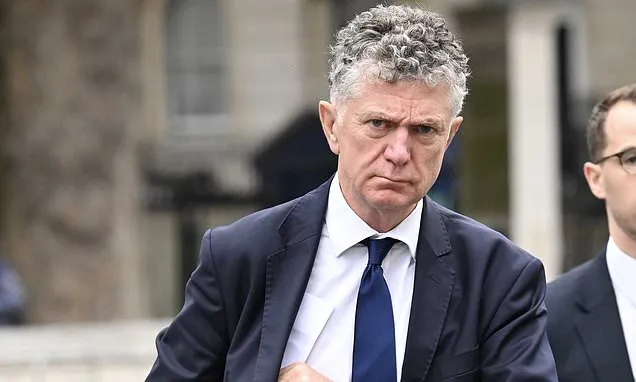Sir Keir Starmer's security chief is to face questions in Parliament about the Chinese spying case - but behind closed doors.
Downing Street confirmed yesterday that national security adviser Jonathan Powell will appear before senior MPs and peers amid questions about why the trial of two men accused of passing secrets to Beijing was abandoned.
But his appearance before the Joint Committee on the National Security Strategy will be in private - even though his predecessors have given evidence to the same committee in public.
The decision by Labour ministers - who had previously claimed Mr Powell should not appear at all because he is a special adviser rather than an official - means the public will not hear his response to the allegations that he was involved in top-secret discussions that led to the collapse of the case.
This newspaper can also reveal that the spying suspects may now never face trial because the Crown Prosecution Service has the power to take over a potential private prosecution in order to halt it.
Meanwhile, Downing Street was forced to deny claims of government involvement, following reports in The Sunday Times that Mr Powell told a briefing that China would not be deemed an 'enemy' of Britain at the trial, a move which experts say would make a successful prosecution under the Official Secrets Act impossible.
No 10 insisted that the CPS had taken the controversial decision to drop the charges at the last minute.
Former defence secretary Sir Gavin Williamson, who sits on the joint committee which will question Mr Powell in private, told the Daily Mail: 'With such a high level of public interest in this case, it would be beneficial for Mr Powell and for Parliament for him to set out quite clearly his involvement or non-involvement.'
Downing Street confirmed yesterday that national security adviser Jonathan Powell (pictured) will appear before senior MPs and peers amid questions about why the trial of two men accused of passing secrets to Beijing was abandoned
'There's an ability for part of the session to be in private and part in public. I think he has whole series of questions he's got to answer.'
But he added that a minister should also provide a statement to the Commons about the case, on the first day back after the conference recess. 'There's a lot of people who have a lot of questions,' Sir Gavin said.
Commons speaker Sir Lindsay Hoyle is considering bringing a private prosecution against former parliamentary aide Christopher Cash, 30, and teacher Christopher Berry, 33, after the espionage charges against them under the Official Secrets Act were dropped.
However, the Daily Mail has learnt that any private prosecution is unlikely to succeed because the Director of Public Prosecutions Sir Stephen Parkinson can take over a case and discontinue proceedings if it does not meet the Code for Crown Prosecutors 'evidential test'.
This means that the suspects are unlikely to face any further prosecution after Sir Stephen halted the case last month over the same issue.
Yesterday it emerged that Scotland Yard also has no plans to pursue the pair for any other offences including lesser crimes such as a breach of data protection rules.
Senior Tory MP Alex Burghart told the Daily Mail: 'Thanks to Labour, two alleged Chinese spies may never be prosecuted. In their desperation to cosy up to China, the Government have put our democracy and our country in danger.'
'Now we hear Starmer's national security adviser will appear before Parliament - but only in private. Why won't Labour be open with the public?' Another leading Tory said that Sir Keir himself had questions to answer over the collapse of the case and the involvement of his national security adviser and Foreign Office mandarin Sir Olly Robbins in the discussions over whether China could be called an enemy.
Shadow home secretary Chris Philp told a Politico event at the Conservative Party conference: 'Apparently, that was an instruction given by Olly Robbins and by Jonathan Powell. I can't imagine Jonathan Powell, who's one of Keir Starmer's closest and most senior advisers, would have done that without discussing it with the PM first, so Keir Starmer has some very serious questions to personally answer.'
The Home Office and domestic security agency MI5 wanted the case to go ahead but the Foreign Office feared it would damage relations with China at a time when Labour is trying to rebuild links and boost trade, it has been reported.
Downing Street insisted the decision to drop the case had been taken solely by the CPS 'entirely independently of the Government'.
It is understood the Government's evidence in the case related to the period when the Conservatives were in power, during which ministers declined to call China an enemy.
Human rights campaigner Luke de Pulford of the Inter-Parliamentary Alliance on China said: 'We need a full public account of how and why the most significant alleged breach of parliamentary security in decades has gone unpunished.'
